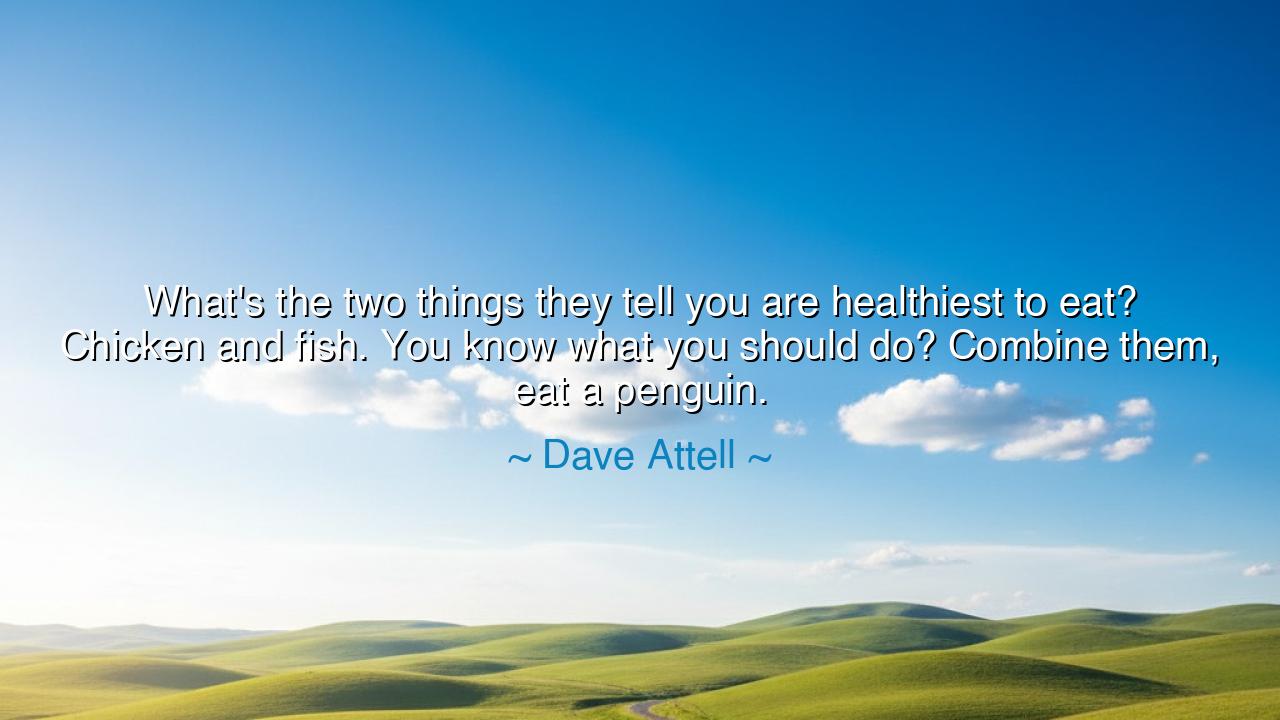
What's the two things they tell you are healthiest to eat?
What's the two things they tell you are healthiest to eat? Chicken and fish. You know what you should do? Combine them, eat a penguin.






In the vast expanse of human knowledge, where wisdom and curiosity meet, there are moments when humor carries with it a profound truth. Dave Attell, a master of wit, delivers a thought-provoking jest with the words, “What’s the two things they tell you are healthiest to eat? Chicken and fish. You know what you should do? Combine them, eat a penguin.” While spoken with humor, these words speak to the eternal human pursuit of balance and the quest for what truly nourishes the body and soul. Through his lighthearted comment, Attell highlights the contradictions that often arise in the pursuit of health, drawing attention to the simplification and oversimplification of the complex relationship between food and well-being.
The ancient philosophers, especially those of the Greeks, understood that the pursuit of health was not found in extremes, but in the balance between body, mind, and spirit. Socrates himself would often say that the balance between moderation and indulgence was the true path to wisdom, recognizing that excessive focus on one thing—whether that be food, pleasure, or self-denial—would lead to imbalance. Just as Attell humorously suggests combining chicken and fish to create something entirely new and yet absurd, the ancients warned against the folly of creating rigid, unnatural rules for things that are meant to be balanced and organic. Health does not arise from the combination of two extremes, but from understanding the natural relationship between our body’s needs and the world around us.
Consider, for instance, the story of Hippocrates, the father of medicine, who believed that the health of the body depended on the natural balance of elements—humors—within us. He understood that it was not enough to follow the advice of simple prescriptions, like eating a certain food or avoiding another. Instead, he called for a holistic approach, one that understood the body as part of a greater whole, governed by natural laws. In Attell’s joke about combining two food sources for a seemingly healthier option, he points to a larger truth: the simplification of health into isolated rules—like the idea that chicken and fish are the healthiest choices—does not capture the complexity of nourishment. True health requires variety, awareness, and a connection to nature itself.
The Romans, too, were keenly aware of the folly of excess, but they also believed in the power of nourishment through simple foods that sustained them through battles and the rigors of their daily lives. Cato the Elder, for example, championed a diet rooted in simple, wholesome foods—vegetables, grains, and small amounts of meat. He recognized that the health of the Roman legions did not come from indulgence in luxury or the pursuit of perfection, but from an understanding of what the body truly required. Like Attell’s humorous suggestion, the idea of creating an unnatural food combination like a penguin—which defies natural dietary norms—reminds us that health is not about complicating or distorting the natural order, but about working with it.
Attell’s words also draw attention to the cultural obsession with food and its contradictory messages. In our modern age, we are inundated with diets, each promising the key to health, but often focusing on isolated rules or foods. Yet, the ancients knew that health is not found in rigid prescriptions, but in a way of life that honors variety, moderation, and connection to nature. Plato wrote of the importance of balance in all things, and this truth extends to the foods we eat. A diet is not just a collection of foods; it is a reflection of the wisdom we hold in our bodies—an understanding that the body is a temple to be nurtured and sustained, not overfed or denied.
The lesson from Attell’s playful suggestion is both humorous and powerful: true health cannot be found in the extremes, nor in the pursuit of an ever-changing set of rules. Instead, health is found in embracing natural balance—eating whole foods that nourish, listening to the body’s needs, and honoring its signals with moderation. It is not about the perfection of a diet or the accumulation of health fads, but about the simple choices that align with the natural rhythms of the body. Just as the ancient wisdom spoke of moderation, so too does Attell remind us that we need not complicate our nourishment with absurd combinations, but rather return to a balanced, holistic approach.
So, as you walk through life, let Attell’s humor guide you. Avoid extremes and understand that the pursuit of health is not about perfection or endless dieting, but about nourishing the body with food that sustains and strengthens it. Like the ancients, let us honor the balance in all things, not just food, but in our lives. Choose wisely, listen to your body, and never forget that true nourishment comes not from confusing complexity, but from embracing the simple, natural truths that guide us all. Health is not a war, but a journey—a journey that requires awareness, balance, and, above all, the wisdom to understand what truly nourishes us.






AAdministratorAdministrator
Welcome, honored guests. Please leave a comment, we will respond soon